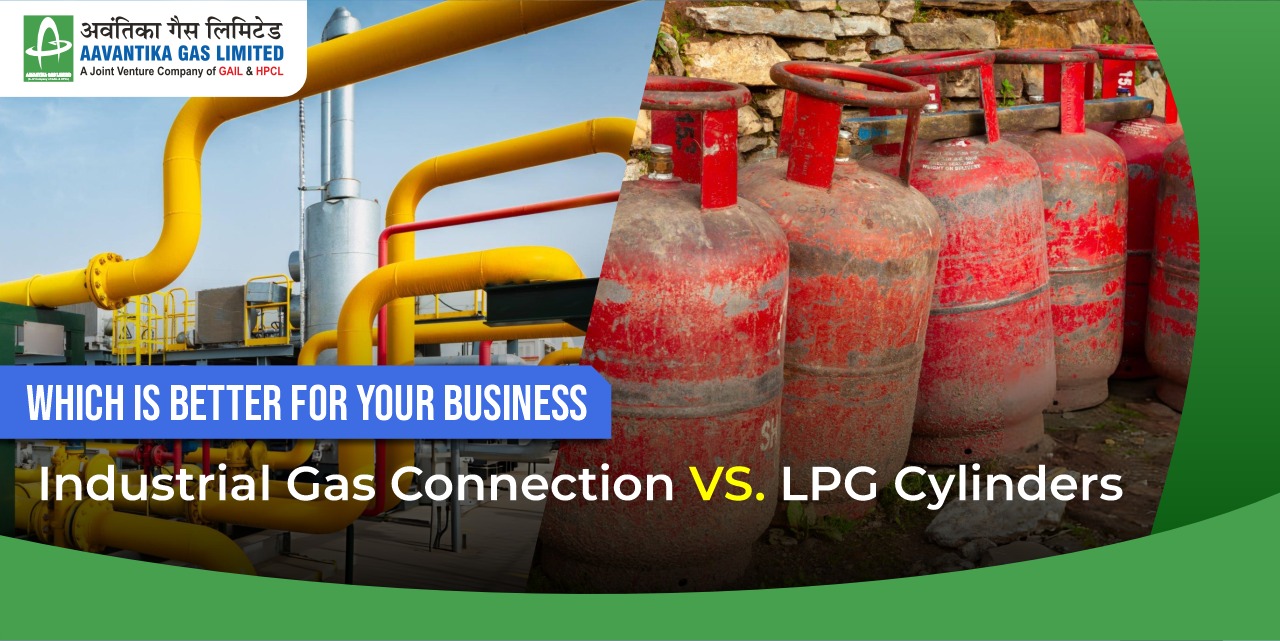Energy consumption plays a crucial role in the smooth operation of industries, manufacturing units, and commercial businesses. Choosing the right type of fuel source significantly impacts cost efficiency, safety, and operational sustainability. Among the widely used options, industrial gas connections and LPG cylinders serve as essential energy solutions for various sectors. However, determining which one is better for your business requires an in-depth comparison of their benefits, costs, safety standards, and overall feasibility. With industries in cities like Indore growing rapidly, understanding the most efficient fuel source can help businesses streamline operations and enhance productivity. The debate between using an industrial gas connection or LPG cylinders is not just about cost but also about long-term viability, energy efficiency, and regulatory compliance. This article explores the key differences between these two energy sources and helps businesses make an informed decision, especially for those looking for an Industrial Gas Connection in Indore.
Supply Continuity and Reliability
One of the key factors businesses consider when choosing between industrial gas connections and LPG cylinders is supply continuity. Industrial gas connections ensure an uninterrupted supply through a dedicated pipeline, eliminating the risk of running out of fuel during critical operations. This makes them ideal for large-scale manufacturing units and industries where a consistent gas supply is necessary. In contrast, LPG cylinders require regular replacements and refilling, which may cause operational delays if not managed properly. Businesses with high gas consumption often find it more convenient to opt for industrial gas connections to avoid disruptions.
Cost-Effectiveness
Another important aspect is cost-effectiveness. While setting up an industrial gas connection requires an initial infrastructure investment, it proves to be more economical in the long run. The per-unit cost of gas supplied through a pipeline is generally lower than that of LPG cylinders. Additionally, businesses can save on logistics and storage costs, as there is no need to allocate space for storing multiple cylinders. LPG cylinders, although initially more affordable, may result in higher long-term expenses due to recurring purchases and transportation costs. Therefore, businesses with higher energy demands often find industrial gas connections to be the more viable option.
Safety Considerations
Safety is a crucial consideration for any business relying on gas-based energy solutions. Industrial gas connections are equipped with advanced safety mechanisms, including pressure regulators, leak detection systems, and emergency shutdown valves. These features significantly reduce the risk of gas leaks and related hazards. On the other hand, LPG cylinders require careful handling and storage to prevent accidents. Businesses must ensure proper ventilation and adhere to safety guidelines to minimize the risks associated with cylinder-based gas supply. For industries prioritizing safety, an industrial gas connection in Indore offers a more secure and controlled gas supply solution.
Environmental Impact
Environmental impact is another factor that businesses must take into account. Industrial gas connections are often associated with cleaner energy sources, reducing carbon emissions and promoting sustainability. Many industrial gas suppliers offer eco-friendly alternatives such as compressed natural gas (CNG) and liquefied natural gas (LNG), which have a lower environmental footprint compared to conventional LPG cylinders. LPG, while relatively clean compared to other fossil fuels, still contributes to carbon emissions and may not be the most sustainable choice for businesses looking to adopt greener energy practices. Companies aiming to reduce their carbon footprint and align with environmental regulations may prefer industrial gas connections over LPG cylinders.
Availability and Infrastructure in Indore
Industries operating in Indore and other growing commercial hubs must also consider local infrastructure and availability when making their decision. Industrial Gas Connection in Indore has become a popular choice for businesses due to the presence of well-established gas distribution networks. With increasing industrialization, the government and private suppliers have expanded gas pipeline networks, making industrial gas connections more accessible and cost-efficient. In contrast, businesses relying on LPG cylinders may face logistical challenges in sourcing and transporting cylinders, especially during peak demand periods.
Operational Efficiency
Operational efficiency is another critical aspect when comparing industrial gas connections and LPG cylinders. Industrial gas connections eliminate the need for manual cylinder replacement, reducing downtime and improving workflow continuity. Businesses can focus on their core operations without worrying about gas supply interruptions. LPG cylinders, while convenient for smaller setups, require regular monitoring and timely replacements to ensure a steady fuel supply. The labor-intensive process of handling cylinders can be a drawback for industries with high energy requirements.
Conclusion
Choosing between industrial gas connections and LPG cylinders depends on factors like business size, energy needs, budget, and safety. While LPG cylinders offer mobility and lower initial costs, industrial gas connections in Indore provide long-term savings, enhanced safety, and sustainability. In Indore and other industrial hubs, a strong gas pipeline network makes industrial connections more efficient. Industrial gas ensures consistent supply, operational efficiency, and regulatory compliance, making it ideal for high-demand industries. Aavatika Gas Ltd. recognises the importance of informed energy choices that enhance efficiency, reduce costs, and support sustainable business growth in the evolving industrial landscape.
FAQs
Q: Can industrial gas connections handle sudden, extreme demand spikes?
Yes, pipelines are designed for consistent, high-volume flow, with pressure regulators and storage buffers ensuring a stable supply during peak operational demands.
Q: Are there hidden maintenance costs with industrial gas connections?
Minimal routine checks and pipeline integrity are managed by suppliers, reducing unexpected expenses compared to frequent cylinder maintenance and replacements.
Q: How does ground temperature impact the efficiency of industrial gas pipelines?
Insulated pipelines maintain consistent gas temperature, minimising volume loss or pressure fluctuations, ensuring a stable energy supply regardless of external conditions.
Q: Can industrial gas connections integrate with renewable energy sources?
Yes, blending biomethane or hydrogen into existing pipelines allows for a gradual transition to greener energy, enhancing sustainability and reducing carbon footprint.
Q: What regulatory hurdles exist when converting from LPG to an industrial gas connection?
Permits and safety compliance inspections are required; suppliers assist with documentation and adherence to local regulations, streamlining the conversion process for businesses.











No Comments
Sorry, the comment form is closed at this time.